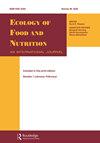使用食物频率问卷评估赞比亚农村儿童的饮食和营养摄入。
IF 1.3
4区 医学
Q4 NUTRITION & DIETETICS
Ecology of Food and Nutrition
Pub Date : 2022-07-01
Epub Date: 2022-02-02
DOI:10.1080/03670244.2022.2028626
引用次数: 0
摘要
本调查为评估赞比亚农村儿童的能量和营养摄入,采用直接称重法编制了半定量食物频率问卷(FFQ),并对153名儿童进行了膳食调查。饮食调查显示,与国际标准相比,赞比亚农村儿童的能量摄入不足。然而,蛋白质摄入量达到了推荐水平;大部分来自蔬菜。碳水化合物的摄取率很高,而脂肪的摄取率相对较低,因为它们的饮食高度依赖玉米。本文章由计算机程序翻译,如有差异,请以英文原文为准。
Assessing Diet and Nutritional Intake of Rural Children in Zambia Using a Food Frequency Questionnaire.
In this survey, to assess the energy and nutrient intake of rural children in Zambia, a semi-quantitative food frequency questionnaire (FFQ) was developed using the direct weighing method for 126 children, and then a dietary survey with 153 children was conducted using the FFQ. The dietary survey revealed that rural children in Zambia are deficient in energy intake compared to international standards. However, the protein intake met the recommended level; most of it came from vegetables. The carbohydrate intake rate was high, while the fat intake rate was relatively low because of a diet that was highly dependent on maize.
求助全文
通过发布文献求助,成功后即可免费获取论文全文。
去求助
来源期刊
CiteScore
3.50
自引率
0.00%
发文量
23
审稿时长
>12 weeks
期刊介绍:
Ecology of Food and Nutrition is an international journal of food and nutrition in the broadest sense. The journal publishes peer-reviewed articles on all aspects of food and nutrition -- ecological, biological, and cultural. Ecology of Food and Nutrition strives to become a forum for disseminating scholarly information on the holistic and cross-cultural dimensions of the study of food and nutrition. It emphasizes foods and food systems not only in terms of their utilization to satisfy human nutritional needs and health, but also to promote and contest social and cultural identity. The content scope is thus wide -- articles may focus on the relationship between food and nutrition, food taboos and preferences, ecology and political economy of food, the evolution of human nutrition, changes in food habits, food technology and marketing, food and identity, and food sustainability. Additionally, articles focusing on the application of theories and methods to address contemporary food and nutrition problems are encouraged. Questions of the relationship between food/nutrition and culture are as germane to the journal as analyses of the interactions among nutrition and environment, infection and human health.

 求助内容:
求助内容: 应助结果提醒方式:
应助结果提醒方式:


